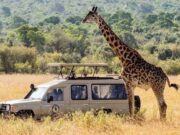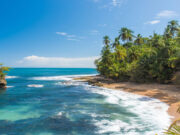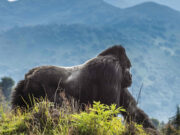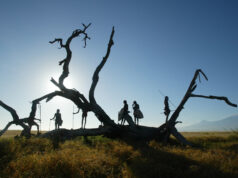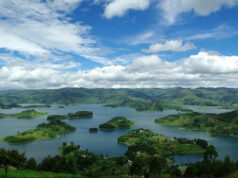Africa offers a diversity of primate safaris with the chance to track endangered mountain gorillas and chimpanzees. Call it a chimpanzee, or chimp, is the common name for one of the two ape species. Four subspecies of chimpanzee exist across Africa; Western, Central, Eastern and Nigerian. The second species in the Pan genus is the Bonobo but there are no subspecies of Bonobo.
Uganda, Rwanda and Democratic Republic of the Congo offer a great deal of primate diversity, and you can even see rare species such as colobus and golden monkeys in certain areas. These countries also boast unique crater lakes, rivers and waterfalls so that visitors don’t just have to keep an eye out for primates when they’re trekking.
Chimpanzees
Chimpanzees are classified as great apes and share 98% of our genes. Prominent characteristics include long arms, opposable thumbs, a black/brownish fur and bare skin on their face, palms, ears and soles of the feet. Highly sociable primates they move in flexible groups of between 15-80 individuals with one dominant male, and communicate through a series of screams, pant hoots, squeaks and barks. Movement during the day is often on the ground and can either be bipedally (upright) or knuckle walking. They are larger than you might think, with males weighing up to 70 kilos, reaching a height of up to 1.7 metres when standing upright.
On the other hand, chimpanzee trekking is better in Kibale National Park, Kyambura Gorge, and Kalinzu Forest Reserve in Uganda, or Nyungwe Forest National Park in Rwanda, which has elevated walking canopies that are 800 metres from the ground in sections.
Chimpanzee tracking / chimpanzee habituation
Chimpanzees can also be tracked in Tanzania and Uganda, and combined with popular gorilla tracking safaris.People come to Uganda for the Mountain gorillas and chimpanzee tracking.It is one thing to spend an hour with the chimpanzees of Uganda it is another experience to be with them all day long.There are about 4950 chimpanzees within Uganda; Kibale Forest alone has the most with about 1500 Chimpanzees. Most visitors visit the chimpanzees much like the Mountain Gorillas for one hour there is however another option that allows you to be with chimpanzees all day long in the forests of Budongo or Kibale Forest. It is the habituation experience all day with chimpanzees in their natural setting.
Chimpanzee tracking is where by a trekker goes to the forest to view the already habituated chimpanzees. The habituated chimpanzees are normally confined in one area and are not aggressive and stubborn. They are friendly.
Chimpanzee tracking can take 1-3 hours.It’s not only chimpanzees you will see on this habituation experience. You will see a host of other things. In Kibale forest for example; you will see elephants, buffaloes, bush pigs, various bird species-the forest has 350 different bird species, and about 12 other kinds of primates. The beauty and richness of the forest is seen in the exotic plants, trees, and butterflies. It is simply amazing. And you need to keep your eyes wide open so you do not miss anything.Kibale forest is the best place to track and habituate chimps in Uganda.
The Chimpanzee Habituation Experience is not for the faint of heart it means an early breakfast, a packed lunch and you are off before dawn breaks into the forest. You meet your guide and walk to where the chimpanzees built nests the night before. Dawn is just breaking and the chimpanzee community you are going to be with the rest of the day is rising from their sleep.
The full-day Chimpanzee Habituation Experience (CHEX) works with a chimp community which is undergoing habituation. Early visitors can watch chimps leaving their overnight nests between 6:00 – 6:30am before feeding, copulating, hunting, breastfeeding, resting, patrolling and displaying until it is time to build new nests around 7pm.
Chimpanzee Habituation Experience entails getting the chimpanzees used to the presence of humans (to remove the fear of humans from the group), a process that takes up to two years and today you are part of that process by your all day presence in the forest. Years ago, it used to be that you had a 20% chance of seeing chimpanzees in the wild, today because of the habituation process that has increased to over 90%. Your day will be full, your camera will fill up with quality pictures of the chimpanzees and you will get to learn to identify them as individuals by their markings, sometimes scars and other unique features that make them stand apart from rest. The day ends as the chimpanzees climb into their newly built nests for the evening and you head back to your lodging for the evening.
A chimpanzee safari can be hard work, sometimes lasting up to 9 hours (return trip) through unpredictable terrain, but it is worth it.Chimpanzees share a whopping 98 per cent of our genetic blueprint, and when watching them, their facial expressions, gestures and use of tools ensure that we know it.
Trek through lush forests in search of chimpanzees full of excitement and anticipation, armed with respect for the guides that know the environment and chimpanzee families like the back of their hand and equipped with your newfound knowledge, hear these excitable primates before you see them, their pant-hoots travelling deep through the forest. Following the calls, enter their world and begin your journey. Scrambling over rocks and hiking the steep paths, you feel the chimps are almost laughing affectionately at the contrast between your efforts to follow them through the undergrowth and how easily they traverse this terrain.”
Chimpanzee tracking in Rwanda
The mountainous rain forests of Nyungwe National Park in southwest Rwanda are home to approx. 500 chimpanzees and 12 other species of primate including the Colobus and Vervet monkey. The walking and hiking here is excellent, with rich flora and fauna and spectacular views. You may witness young chimps playing; adults feeding high up in the fig trees; others swinging effortlessly between the vines. Once you have found a chimpanzee community, you will have one magical hour to enjoy the company of these fascinating primates. This is a true adventure.
Gorilla trekking
Gorilla trekking can be done in Bwindi Impenetrable National Park and Mgahinga Gorilla National Park in Uganda, in Volcanoes National Park in Rwanda, and in Virunga National Park in the DRC. All of these parks are within the great Albertine region, and each has various trekking stations as well as a number of gorilla families. For those looking for shorter trips, a Rwanda gorilla safari can be the best option while for those looking to more experiences like a gorilla trip combines with a traditional wildlife safari, Uganda is the best option to choose.
Searching for primates always involves quite a hike, and all treks start early in the morning after a briefing from the park rangers on how to behave with the apes. It is therefore, important to be in relatively fit and good health before tracking primates.
The dry season is arguably the best time for all primate safaris in Africa as the ground can be muddy and slippery during the rainy season. The periods from June to October and from December to March are the best months, and also the peak periods, which is why advanced bookings are important.
Golden monkey trekking
In East Africa, golden monkeys reside in Uganda and Rwanda and if one wants to trek them, he/she will have to go to volcanoes National in Rwanda or Mgahinga National Park in Uganda where gold meets silver to give you an everlasting safari experience.
Golden monkey trekking in Volcanoes National Park begins at 7:00am just like gorilla trekking and in Uganda; it starts at 8:00am. One is supposed to be at the park headquarters for briefing about the park while with golden monkeys and thereafter, they trek into the forest to look for them.Golden monkey trekking is a one hour activity. Once you have found the golden monkeys, you will be allowed just one hour to observe their behavior, take photographs and then return back to your lodge.
The price of a permit in Rwanda (Volcanoes National Park), a permit to trek golden monkeys costs USD100 (2016) and USD50 in Uganda (Mgahinga National Park). This included, park fees, services of a ranger guide, and spending one hour with habituated golden monkeys. Golden monkey permits can be booked in advance or on ground since there is no limit on the people to trek them. Age limit for those interested in trekking golden monkeys is 12 years much as it is not as strict as gorilla trekking.



